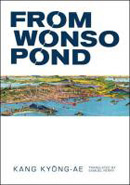

The Feminist Press, paperback, 9781558616011
What a journey this book has taken! In order to fully appreciate this treasure of Korean literature, you will need some background information before you start to read. From Wŏnso Pond first appeared in serialised form in a daily newspaper in Korea. Although published as a novel in 1940, the book did not pick up a wide readership in Korea until 1953. It was another fifty-six years before it would be translated into English.
Kang Kyŏng-ae (1906-44) was a rebellious young woman who read Karl Marx and mixed with intellectuals. At times she was criticised for the simple style and the structure of her writing. Kang defended herself by making known her belief that art should be accessible to everyone. As translator Samuel Perry writes in his Introduction, Kang "sought to bring the voices of the oppressed into a popular form of literature."
From Wŏnso Pond is set in the region which is now North Korea. It is the story of Sonbi, a beautiful peasant girl, who works in the house of the wealthy Tokho. Tokho's wife and daughter are horrid to Sonbi; they are the "ugly step-sisters" in what we hope will be a Cinderella story. Okchom, the vile daughter, is in love with a student named Sinch'ol. Although we pray that Sinch'ol might be Sonbi's prince, it is quite possible that the rough-mannered peasant with a sensitive heart Ch'otchae could prove to be her saviour.
I was fascinated to learn about Japanese-ruled Korea in 1934.I had no idea that the wealthier section of society was so Westernised—motor cars, women's fashion and relative freedom for women. Arranged marriages were in the past and young women could travel and live unsupervised.
The novel's beginnings as a serial are obvious. There are moments of melodrama, and each chapter ends with a cliffhanger. Once you accept the structure for what it is, however, the story is suspenseful and compelling. Furthermore, as the novel progresses Kang brings politics into the lives of the characters, which engenders an increasingly serious tone. The Communist movement in Korea affects each of our characters and leads to an unexpected ending.
From Wŏnso Pond is a memorable novel which vividly portrays Korean life through the eyes of its characters. The translation is eminently readable, despite a few jarring slips into American slang. I am delighted that the Feminist Press has reissued this vibrant and compelling work of Korean literature; it is a novel that deserves to be much better known.
